- Home
- Tara Taylor Quinn
The Secret Son Page 10
The Secret Son Read online
Page 10
“What possible reason could you have for asking such a thing?”
“Jefferson’s topping the polls right now,” Rudy said, any pretense of casualness gone. “Don’t kid yourself into thinking Kevin’s not part of the reason.”
Erica didn’t kid about things like that. She knew damn well what Rudy could do with such damaging information. But she wasn’t yet sure how she was going to prevent him from using it.
“What do you want?” she asked.
“An exclusive on the real story about the breakup of your marriage. A sixty-five-year-old man doesn’t leave a gorgeous young wife for a woman like Pamela Woods.”
Men like Jeff did. Not that she expected Rudy, or indeed any of Washington’s jaded contributions to humanity, to comprehend that.
She pinned Rudy with a hard stare. “I give you the inside scoop and you forget your doubts about my son’s paternity.”
Without blinking, he said, “Yes.”
“I have your word on that?”
“Yes.”
Studying him, Erica silently searched for any other solution. Over the years Rudy had established his trustworthiness. At least with her. Time and again he’d kept privileged information to himself; he’d also come to her on several occasions with threats to Jefferson’s reputation and given her a fair shot at the other side of the story. She had no reason to doubt he’d do as he said.
It just meant that she’d have to swallow her pride in order to keep her world intact.
She thought of Jefferson. His career. The millions of people he affected. She thought of Jack. And she thought of Kevin.
“Okay.”
“HI.”
Erica’s heart leapt as she immediately recognized the voice on the other end of the line a couple of nights later. She’d only spoken to him on the phone twice in her life and already she knew his voice.
“Hi.”
“How’s your week been?”
“Busy. Good.” If you didn’t count the fact that she didn’t dare leave her son with a sitter. That she had her hands full protecting her ex-husband’s image. And that she was forced to see the half-truths she’d given Rudy—her claim that she hadn’t been able to perform her “wifely duties” for Jefferson—smeared all over the local papers.
And some national ones, too.
“How about you? Where are you?”
Two weeks ago he’d called her from Texas. And last week from Kansas. Both times after being summoned by state police. One had been a false alarm—the person who said he had a little girl locked in a cabin with him had already killed the child, as the police discovered when they found her body in a gully. The other, a child-custody altercation resulting in a father holding his own son hostage, had had a successful conclusion. The boy had been returned to his mother. No one had been hurt.
“I’m home,” he said now. “At my apartment in New York.”
“The same one you had six years ago?” Not that she’d ever seen it.
“Yeah.” There was a pause. “I picked up a copy of the Times today,” he said.
The statement wasn’t a casual one.
“You saw the article.” It was inevitable. But still…
“I understand that your job is to make Jefferson Cooley look good,” he said. She’d never heard this tone before. “I’m just not sure why protecting Jefferson means running yourself down.”
She couldn’t answer that. Not with the truth. “I don’t always have a say in what reporters print,” she prevaricated. And hated what the tangle of secrets and lies was doing to her life. They’d now infiltrated even the make-believe world where she and Jack lived.
She’d known that if they continued to keep in touch, it was bound to happen. But at the same time, she’d been trying to pretend that, as long he was nothing but an occasional long-distance phone call, she could keep him separate from the rest of her life.
It had been a stupid game to play. Of course he wasn’t separate from her real life. He was the father of her child.
And every single day she had to bear the burden of knowing that when he didn’t.
“You’re asking for a retraction, then?” he asked after a moment, sounding somewhat mollified.
“No.”
“Why not? Erica, you don’t have to—”
“Jack,” she interrupted. “It’s not that big a deal. When you’re married to a senator, you get used to seeing the occasional uncomplimentary article. I save my battles with the press for things that really matter.”
She looked around the office she loved, the plants on the windowsill, the view overlooking Capitol Hill. Picking up a pencil, she tapped it against the pad in front of her. The one on which she’d just scribbled notes from her meeting with Jefferson. “Do you ever go to Maggie’s?” she asked suddenly, not entirely sure why she wanted to know. It wasn’t something she’d mentioned during their previous conversations. Neither had he.
“Occasionally.”
“Just for a drink?”
“No.” He paused and, dropping her pencil, she waited. “I go when I need to be reminded of certain feelings.”
“Like what?”
“I’m not sure. Maybe the feelings that don’t play a part in my life anymore.”
“Then why do you want to be reminded?” she asked recklessly.
“For one thing it helps me in my work. The emotions responsible for some of the most heinous crimes are good feelings gone bad.”
“Passion?”
“Yes.”
Erica rested her forehead against her palm. A lack of passion had cost her her marriage.
But in another sense, it was passion that had brought the end of the marriage. Passion for Jack…
“What do you think makes that happen?” she asked him. “Good feelings going bad?”
“Life, I guess. Circumstances. The things that happen to people.”
“Tragedy.”
“Sure, or abuse. But I think sometimes the reason is a lot more innocuous than that. Like perceptions that change over time.”
She thought of Jefferson. Their relationship had begun as a good thing and eventually become a source of deep unhappiness to him. She hadn’t changed; neither had her feelings for him. His desire hadn’t changed, nor his will. But with the passage of time, what had once been a joy had, in the end, cost Jefferson his self-respect.
“So how do you trust in a good emotion when it can so easily turn bad?”
“I don’t.”
It didn’t seem to matter that she’d already determined this for herself. His confirmation was crushing.
“So you only remind yourself of these feelings in order to better relate to your suspects?” she asked numbly.
“Not entirely.”
She waited, picked up the pencil again. He didn’t elaborate.
“So why else?”
“Because for a lucky few, the good feelings—the honest and powerful emotions—sustain them through a lifetime. Every once in a while I feel a need to remember that.”
The admission warmed everything that had been hurt and frozen in Erica. It worried her, too. Was she what reminded him of happily ever after?
That seemed to be what he meant. But she couldn’t be.
Sure, in some inexplicable way Jack made her feel alive. Hopeful. But only because he was safely ensconced in a memory—a make-believe week in New York.
She kept waiting for him to mention the Washington job…and was relieved when he didn’t.
Washington was real life.
Washington was Kevin. And Jefferson.
But still, as she hung up the phone, she was already hoping he’d call again.
CHAPTER TEN
KEVIN WASN’T GOING to preschool today. He’d turned five now and preschool was for babies. Kevin was through with being a baby. He was a man now. And it was almost summer, anyway.
As he buttoned up his shirt, struggling to get the buttons through the holes, he told himself a story about a big boy who knew all the col
ors and numbers and other dumb stuff they taught in preschool. The boy didn’t care that he wouldn’t get to be captain on the team when they played ball, and he didn’t really want to do the clay stuff and…
Before he could get any further with the story, it was time to tie his shoes. He knew he had to keep the bows even so when he wrapped one around the other, he didn’t end up with a long string, instead of a circle. Then all he needed to do was the necktie. He tried his best. Since he was a man now, he’d borrowed the tie Daddy had left the last time he was over. No more already tied ones with the little plastic things. Daddy had shown him how to put it on.
He expected he’d have to argue with Mommy, but no matter what, he wasn’t going to school. He had to go to her work with her. He had to find out about the nucl’ar war missiles Daddy was fighting about. People talked about new wars a lot, and since Kevin was a man now, he might have to be a soldier, too. The idea scared him. But he had to find out why his mom and dad were so worried. That meant he had to be like Daddy and know everything. Important stuff. Not like colors and numbers. He had to learn about nucl’ar weapons.
He couldn’t do that at preschool.
“HI.”
“Hi.”
Their conversations always started out the same. Jack liked the familiarity.
“How’s your week been?” It was almost two months since he’d seen her.
“Okay. Where are you?”
“Home. New York.” He looked around the apartment. The furniture that had come with the place. The bare walls. Naked windows except for the blinds that had been there when he’d moved in. Other than books and magazines, his skiing and other recreational equipment, his computer, there was very little of him in evidence.
Not much to leave behind if he took the Washington job. This was not something he talked to Erica about. Not for the first time, he wondered what her home looked like. The curiosity to know had grown gradually into a yearning. When had that happened?
“Jack?”
“Yeah?” It was midmorning. The July sunshine gave the city below a clear sharp brightness. Nothing like the dark mystery it had been the night before, when he’d wanted to call Erica and had no way of reaching her.
“Why are we doing this?”
“What?”
“We’ve been talking to each other every week for two months. Why, Jack?”
“Because we like our conversations?”
“Is that all?”
“No.” Although his instinct was to be evasive, he couldn’t. Not with Erica. “We like each other, too.”
He thought of the night they’d spent together in New York. He’d been thinking of that night periodically ever since it happened. Sometimes with incredible thankfulness, sometimes with great regret. But lately he’d been remembering their time together with a longing he could neither explain nor deny.
“Do you think it’s wise that we continue?”
“What do you think?” It was a cop-out but the best he could do.
“I think we’re very good for each other.” She spoke slowly, thoughtfully.
He relaxed a little as he watched a woman down below leave the building across the street and get into a cab. Because the sun was so bright, she was more shadow and outline than person, lacking the substance of a human form. Kind of like Erica?
In some ways, she was that unreal, that distant from him. Yet in others… “How so?”
“We talk about things that matter. Make the world a little clearer for each other.”
He nodded. “From the very beginning we’ve created an environment that allows us to be open-minded about each other’s thoughts and opinions. That’s rare in today’s world.” He’d only now realized they had that. It was important.
“Knowing you’re out there makes me feel a little less lonely.”
Loneliness was part of his life, yet he supposed there was something to what she said. Some reason he kept calling her. And thinking about calling her.
And then an awful thought occurred to him. Turning his back on the sunshine, Jack asked, “Do you want me to stop calling?”
“No.”
“Good. Now that we’ve established that it’s okay to talk, are you going to tell me what’s bothering you?”
“Do you ever wonder what’s going to happen if this gets to be more than two strangers talking?”
“Don’t you think it’s already way past that point?” The words came out automatically; he’d certainly never planned to say them.
He tried to picture Erica in her office, as though imagining her there made the question more manageable.
“Didn’t it happen the first night we met?” he asked quietly.
Jack paced the hardwood floors of his apartment, thinking. He knew from experience how to deal with situations that were threatening to detonate.
“Yes.”
Her answer panicked him. So he did what he’d been trained to do when a topic reached an explosion point. He backed away. For the time being.
“Is anything else bothering you?” he asked.
She paused again. “Nothing you want to hear about.”
“I didn’t know there was anything you’d have to say that I wouldn’t want to hear.”
“We never talk about Kevin.”
“You never mention him,” he said.
“I know. And you never ask about him.”
“Not because I don’t want to hear about him.”
“You’re sure?”
He hoped so. The boy was hers. Not his. “Of course.”
“He’s scaring me.”
He’d been preparing himself to hear about naughtiness, time demands, maybe some school—no, wait, it was summer.
“Scaring you in what way?”
“My little man-child is living, breathing and sleeping nuclear weapons. It’s all he talks about. Whenever he plays, it’s with his soldiers. He comes to work with me and asks everyone what they think about nuclear missiles. Last night I looked in on him before I went to bed and he was wide awake. When I asked what he was doing, he said he was figuring out how to fight the bad guys so they wouldn’t drop their nuclear bombs on us.”
Jack frowned. “Does anybody ever play ball with the kid?”
“Jeff used to all the time. He still offers, but Kevin isn’t interested. He either wants to play senator and White House—a new game he came up with at the beginning of the summer—or he climbs on Jeff’s lap and asks him the same questions over and over. Will the good guys ever get rid of nuclear weapons or will they always be there.”
“Have you talked to anyone about it? A professional.”
“He’s been seeing a counselor since the divorce, but so far, nothing’s changed. He’s always been an intense little boy. And far too smart for his own good. Jeff and I treated him more like an adult than a baby from an early age, talking to him as though he could understand what we were saying. Hindsight being twenty-twenty, I’m afraid that was our first mistake.”
Jack wondered if he and Melissa would have done the same with Courtney….
“What does the counselor say?”
“She says it’s normal for kids his age to go through stages where they obsess about one thing or another. With some boys it’s guns or superheroes. With Kevin it’s nuclear weapons.”
“So she thinks it’s a stage that’ll pass?”
“Maybe.”
“What do you think?”
“I don’t know.” Her voice dropped. “A couple of weeks before school ended, he refused to go anymore. I’ve been bringing him to work with me, thinking it would help make him feel more secure if we kept him close. Now I’m wondering if it’s only making things worse, if placing him in this environment is hindering him from being a kid.”
Jack was completely out of his element. He saved kids. He didn’t, under any circumstances, raise them. “What does his counselor say about that?” He said the only thing he could think of.
“That it might be good to get him in some ki
nd of play group, but that being here with Jeff and me might be good for him, too.” She sighed. “Not very helpful, huh?”
“Sounds like the whole damn thing’s a crap-shoot.”
“Yeah.”
“So I guess you just have to trust your instincts and do what you think is best.”
“Jack?”
“Yeah?”
“I can’t have a relationship with you.”
A young girl, maybe seven or eight years old, came running up the sidewalk. Jack watched as she went from the corner to the building across the street. She climbed the steps and disappeared inside. She should never have been allowed on the streets of New York by herself.
“You want me to stop calling.”
“No! I…just…I’ve… Twice I’ve been blindsided, you know? I go along, thinking life is fine, only to find out that I’m not seeing what the other person is…. I’m sorry, I’m not making any sense.”
“Yeah, you are. Go on.”
“When I’m in a relationship, I can’t seem to tell if I’m making my partner happy. I’ve been through two broken marriages and I didn’t have any idea that the breakup was coming in either case. I can’t do that again. Can’t go through worrying it might happen, constantly looking for signs or signals that I never seem to notice, anyway.”
Jack was almost ashamed at the relief that flooded through him. “You’ve been hurt in a very private personal way.”
“Yeah.”
“Me, too.”
“So we’re okay, just to talk?”
He couldn’t come up with any better alternative. “Yeah.”
“Your calls help a lot.”
They helped him, too.
JEFFERSON WAS TAKING some serious hits, Erica knew, with his support of the environmentalists who opposed funding for more nuclear weapon facilities across the United States. He didn’t want his loved ones living by or working in any such facility; how could he support other Americans having to do so? Waste disposal alone was too big a risk factor.
That didn’t even take into account the question of whether they weren’t just asking for worldwide annihilation by considering a program to once again build weapons that could wipe out entire cities. He’d never believed that possessing nuclear weapons served as a deterrent. The more the United States built, the more other countries would build until, one day, some rogue state decided to exploit its power to the final limit. Or some friendly nation became an enemy. Once the first bomb was dropped, it would just be a matter of trading targets until there was nothing left.

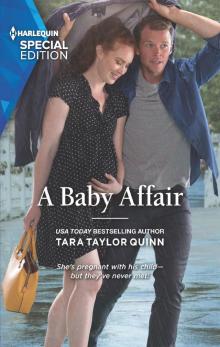 A Baby Affair
A Baby Affair Having The Soldier's Baby (The Parent Portal Book 1)
Having The Soldier's Baby (The Parent Portal Book 1) Colton's Lethal Reunion
Colton's Lethal Reunion A Baby Affair (The Parent Portal Book 2)
A Baby Affair (The Parent Portal Book 2) Colton's Lethal Reunion (The Coltons 0f Mustang Valley Book 2)
Colton's Lethal Reunion (The Coltons 0f Mustang Valley Book 2)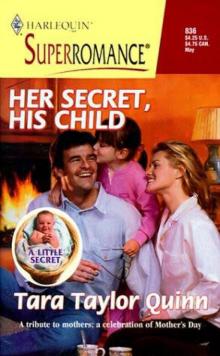 Her Secret, His Child: A Little Secret
Her Secret, His Child: A Little Secret Shielded In The Shadows (Where Secrets Are Safe Book 17)
Shielded In The Shadows (Where Secrets Are Safe Book 17) Her Christmas Future
Her Christmas Future A Mother's Secrets
A Mother's Secrets The Baby Arrangement
The Baby Arrangement Having the Soldier's Baby
Having the Soldier's Baby Colton's Killer Pursuit
Colton's Killer Pursuit Fortune's Christmas Baby
Fortune's Christmas Baby Shielded in the Shadows
Shielded in the Shadows His Brother's Bride
His Brother's Bride Colton 911--Family Defender
Colton 911--Family Defender Her Motherhood Wish (The Parent Portal Book 3)
Her Motherhood Wish (The Parent Portal Book 3) Her Detective's Secret Intent
Her Detective's Secret Intent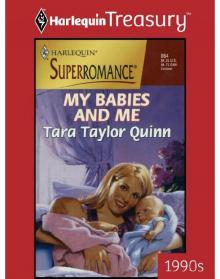 My Babies and Me
My Babies and Me For the Children
For the Children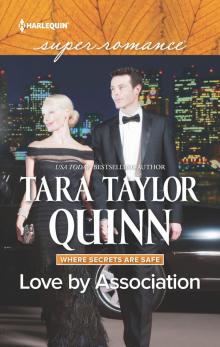 Love by Association
Love by Association A Child's Wish
A Child's Wish 25 Years
25 Years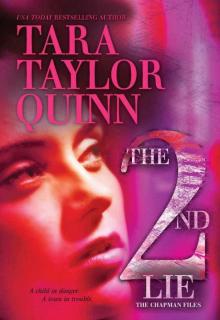 The Second Lie
The Second Lie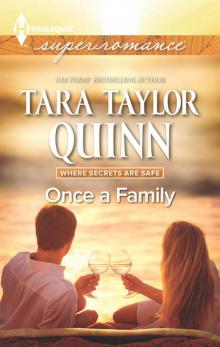 Once a Family
Once a Family An Unexpected Christmas Baby
An Unexpected Christmas Baby Her Secret Life
Her Secret Life Falling for the Brother
Falling for the Brother Nothing Sacred
Nothing Sacred Full Contact
Full Contact From Here To Maternity: A Second ChancePromoted to MomOn Angel's Wings
From Here To Maternity: A Second ChancePromoted to MomOn Angel's Wings Becca's Baby
Becca's Baby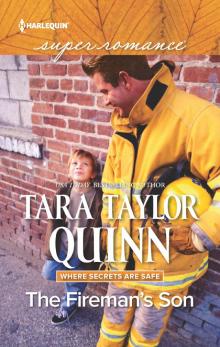 The Fireman's Son
The Fireman's Son The Night We Met
The Night We Met My Sister, Myself
My Sister, Myself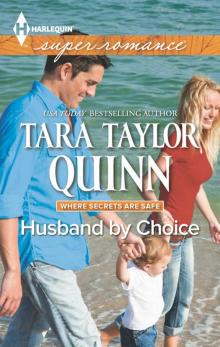 Husband by Choice
Husband by Choice Once Upon a Friendship
Once Upon a Friendship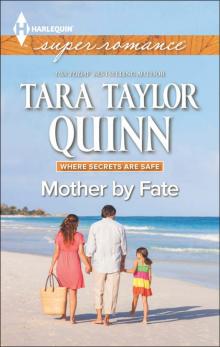 Mother by Fate
Mother by Fate Born in the Valley
Born in the Valley The Baby Gamble
The Baby Gamble Shotgun Baby
Shotgun Baby Just Around the Corner
Just Around the Corner His First Choice
His First Choice Hidden
Hidden Her Motherhood Wish
Her Motherhood Wish Second Time's the Charm
Second Time's the Charm It Happened on Maple Street
It Happened on Maple Street Her Lost and Found Baby
Her Lost and Found Baby A Daughter's Story
A Daughter's Story The Birth Mother
The Birth Mother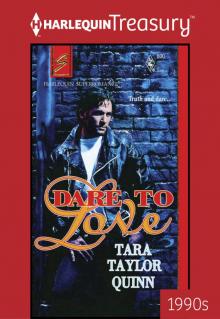 Dare to Love
Dare to Love The Moment of Truth
The Moment of Truth A Daughter's Trust
A Daughter's Trust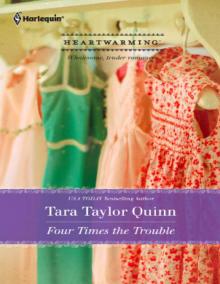 Four Times the Trouble
Four Times the Trouble A Family for Christmas
A Family for Christmas For Joy's Sake
For Joy's Sake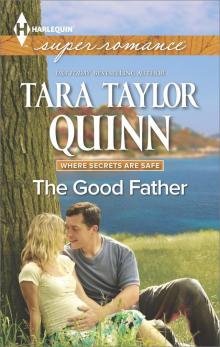 The Good Father
The Good Father Another Man's Child
Another Man's Child Once Upon a Marriage
Once Upon a Marriage Merry Christmas, Babies
Merry Christmas, Babies The Cowboy's Twins
The Cowboy's Twins A Son's Tale
A Son's Tale It's Never too Late
It's Never too Late Her Soldier's Baby
Her Soldier's Baby The Truth About Comfort Cove
The Truth About Comfort Cove The Promise He Made Her
The Promise He Made Her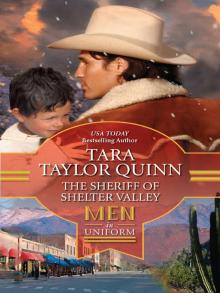 The Sheriff of Shelter Valley
The Sheriff of Shelter Valley White Picket Fences
White Picket Fences Child by Chance
Child by Chance The Third Secret
The Third Secret The Promise of Christmas
The Promise of Christmas The Secret Son
The Secret Son The Friendship Pact
The Friendship Pact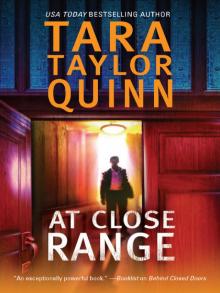 At Close Range
At Close Range